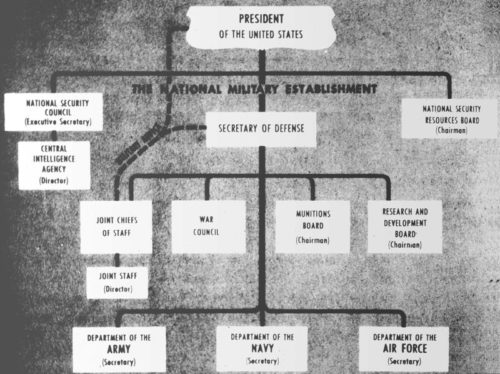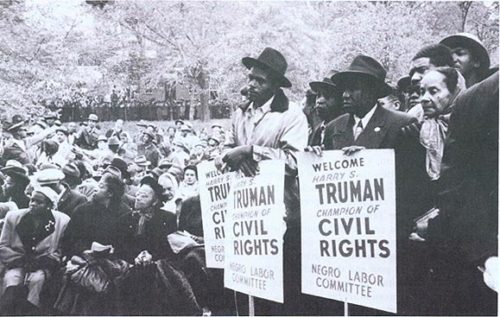A recent post I published gave some of the backstory of modern intelligence and information warfare in America, from 1930s through WWII. That post actually culminates on this day in 1947, when the CIA was established officially.
The history department of the CIA doesn’t put things lightly when it describes their founding in the 1947 U.S. National Security Act (NSA):
President Harry S. Truman signed the National Security Act of 1947 (P.L. 80-235, 61 Stat 496) on July 26, 1947. The act – an intricate series of compromises – took well over a year to craft. […] The importance of the National Security Act cannot be overstated. It was a central document in U.S. Cold War policy and reflected the nation’s acceptance of its position as a world leader.
You can read more details about that “intricate series of compromises” they mention, in a 1996 document hosted by the State Department: 1945-1950 Emergence of the Intelligence Establishment
Speaking of the State Department, their historian is far more muted in assessment of the NSA and takes a weird tangent that leaves the CIA to a secondary story:
Each President has accorded the NSC with different degrees of importance and has given the NSC staff varying levels of autonomy and influence over other agencies such as the Departments of State and Defense. President Dwight D. Eisenhower, for example, used the NSC meetings to make key foreign policy decisions, while John F. Kennedy and Lyndon B. Johnson preferred to work more informally through trusted associates. Under President Richard M. Nixon, the NSC staff, then headed by Henry A. Kissinger, was transformed from a coordinating body into an organization that actively engaged in negotiations with foreign leaders and implementing the President’s decisions. The NSC meetings themselves, however, were infrequent and merely confirmed decisions already agreed upon by Nixon and Kissinger.
This overstates the changes made. While Truman had a particular take on it, those following him into office haven’t been entirely different. The Act created a National Security Council (NSC) with an Executive Secretary to advise the President indirectly (arguably through Department of State), yet did not say anything about a National Security Advisor (NSA). Nonetheless after Eisenhower’s appointment of Robert Cutler in 1952 to be “Special Assistant to the President for National Security Affairs”, which elevated/oversaw the Council, every president since has appointed a NSA.
The Air Force historian, for some additional perspective, takes an opportunity to thumb its nose at the Army and Navy, while pumping up its own balloon and ignoring the CIA altogether:
This act officially established the United States Air Force as a separate and co-equal branch of the United States Armed Forces. The U.S. Air Force’s quest for independence was a long and often contentious struggle between air-minded officers and the entrenched Army and Navy bureaucracy.
To be fair, the NSA also replaced the Department of War (started in 1789) with an Army Department in a new National Military Establishment (NME). Seems petty and wrong for the Air Force to be talking about independence from an entrenched Army, given an Army department also was brand new and co-joined to the Air Force in NME (by 1950 called the Defense Department).

However, back to the CIA claiming acceptance of world leader position in 1947, it would take another whole year to this very same day in 1948 before Truman signed Executive Order 9981 to formally push Civil Rights and declare an end to discrimination in its own military.

The CIA historian is not wrong about the NSA being a significant event in American history. It completely shifted the entire country to discussion of National Security along the lines that the CIA’s father Donovan in “room 109” had envisioned. It seems obvious now because the shift is complete but back in 1947 it was revolutionary for the term “security” to bring more expansive thinking than prior terms such as defense, adversary or threat.
Somehow both this creation of the National Security mindset and the seminal Civil Rights order for it to work properly always have taken a back seat, if mentioned at all. Almost all narratives given about America during the Cold War focus instead on the Truman Doctrine and Marshall Plan. Check out my BSidesLV presentation called “Hidden Hot Battle Lessons of the Cold War” for more on this topic of American security, leadership and civil rights.